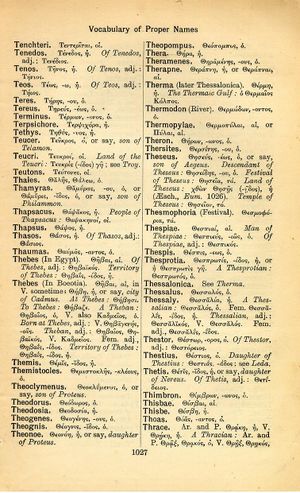Tereus: Difference between revisions
From LSJ
Κάλλιστον ἐν κήποισι φύεται ῥόδον → Pulchrius in hortis gignitur nihil rosa → Die Rose ist das Schönste, was im Garten wächst
(Names) |
(6_16) |
||
| Line 1: | Line 1: | ||
{{WoodhouseENELnames | {{WoodhouseENELnames | ||
|Text=[[File:woodhouse_1027.jpg|thumb|link={{filepath:woodhouse_1027.jpg}}]]Τηρεύς, -έως, ὁ. | |Text=[[File:woodhouse_1027.jpg|thumb|link={{filepath:woodhouse_1027.jpg}}]]Τηρεύς, -έως, ὁ. | ||
}} | |||
{{Lewis | |||
|lshtext=<b>Tēreus</b>: ĕi or ĕos, m., = Τηρεύς.<br /><b>I</b> A [[king]] of [[Thrace]], [[husband]] of [[Procne]], the [[sister]] of [[Philomela]], whom he violated, Hyg. Fab. 45; Ov. F. 2, 629; id. M. 6, 497, 6. 615; 6, 635; Mart. 14, 75, 1.—Hence, Tērĕĭdes, ae, m., the [[offspring]] of [[Tereus]], i. e. his [[son]] [[Itys]], Ov. Ib. 436.—<br /><b>II</b> The [[name]] of a [[tragedy]] by [[Attius]], Cic. Att. 16, 2, 3; 16, 5, 1. | |||
}} | }} | ||
Revision as of 09:08, 13 August 2017
English > Greek (Woodhouse)
Τηρεύς, -έως, ὁ.
Latin > English (Lewis & Short)
Tēreus: ĕi or ĕos, m., = Τηρεύς.
I A king of Thrace, husband of Procne, the sister of Philomela, whom he violated, Hyg. Fab. 45; Ov. F. 2, 629; id. M. 6, 497, 6. 615; 6, 635; Mart. 14, 75, 1.—Hence, Tērĕĭdes, ae, m., the offspring of Tereus, i. e. his son Itys, Ov. Ib. 436.—
II The name of a tragedy by Attius, Cic. Att. 16, 2, 3; 16, 5, 1.

